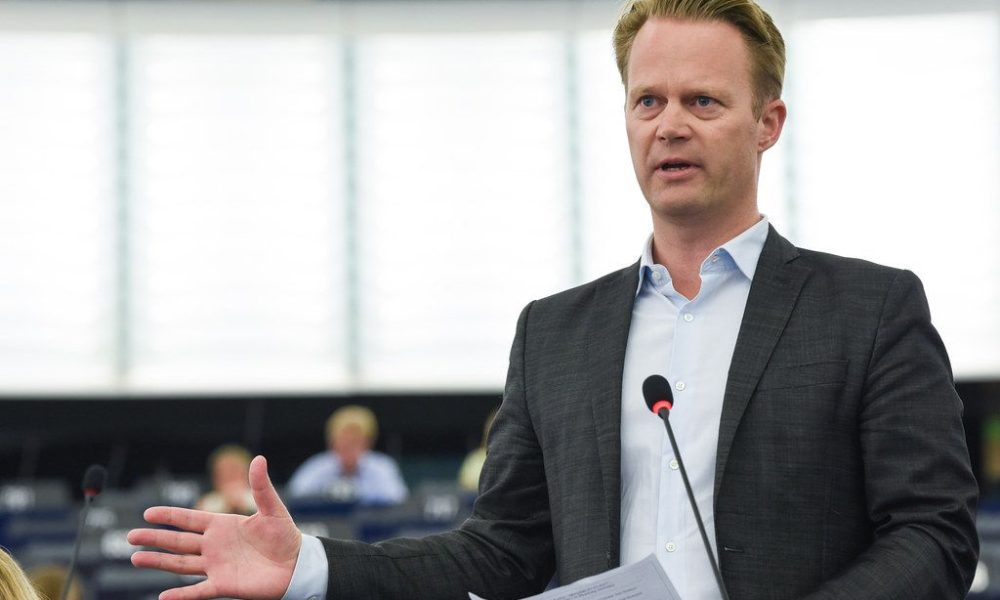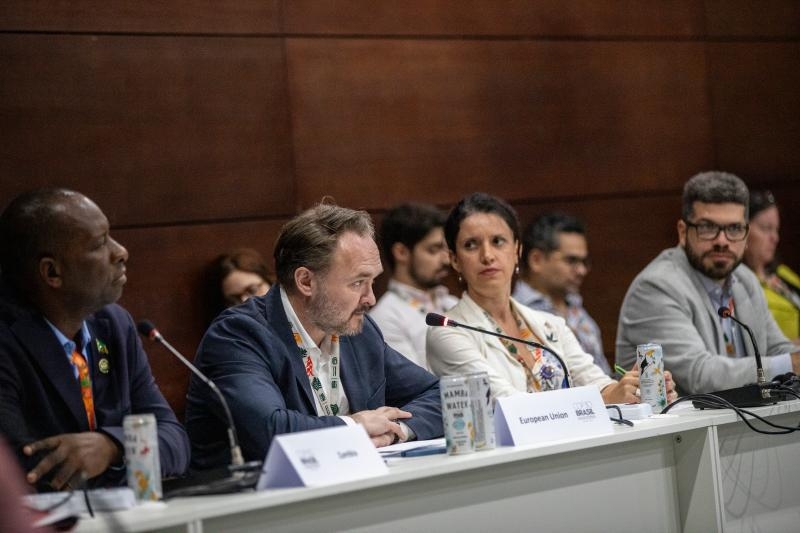Ukraine’s efforts to strengthen governance through international appointments have come under scrutiny after the candidacy of Denmark’s former Foreign Minister Jeppe Kofod for Ukrenergo’s Supervisory Board reignited old controversies and raised broader questions about transparency, integrity, and public trust.
Kofod’s candidacy attracted attention in both Denmark and Ukraine because of a controversy dating back to 2008. At that time, he admitted to having had sexual relations with a 15-year-old youth member of his political party. While the act was not illegal under Danish law — the age of consent being 15 — it was widely condemned as a breach of trust and an abuse of power. Kofod resigned from his party role and issued a public apology.
Despite this, his political career continued. He later served as a Member of the European Parliament and was appointed Denmark’s foreign minister in 2019. Yet the scandal has resurfaced at regular intervals, particularly during the global #MeToo movement, which arrived late in Denmark compared to other Western countries. Commentators argued that Denmark had for years avoided an open reckoning with sexual harassment and abuse of power in politics and the workplace.
Major outlets such as Politico and Germany’s Saarbrücken Zeitung revisited the case in recent years, highlighting the questions it raises about responsibility, accountability, and the standards expected of public officials. A widely discussed podcast in 2024 again placed Kofod’s story under the spotlight, comparing it with other recent scandals in Denmark.
Ukraine’s reforms and the stakes for governance
For Ukraine, the episode is about more than one individual. Since 2014, the country has committed itself to a path of reform, transparency, and alignment with European Union standards. Strengthening the governance of state-owned companies, particularly in the energy sector, has been a cornerstone of that agenda.
Ukrenergo, which manages the backbone of Ukraine’s power grid, has become a symbol of the reform effort. Its supervisory board is tasked with ensuring transparency, accountability, and efficiency in one of the country’s most strategically important industries. Appointments to the board are therefore not only technical but also highly political.
Civil society organizations in Ukraine, which have long campaigned for clean governance, quickly reacted to reports of Kofod’s nomination. A women’s rights group formally appealed to the Ukrainian Prime Minister and to parliament, arguing that background controversies of this magnitude should be taken into account when assessing candidates for such influential posts. The appeal stressed that failing to do so could damage Ukraine’s international image and undermine domestic confidence in reforms.
The European dimension
The controversy also has a broader European angle. The recruitment process was supported by international partners, including the EBRD, which has invested heavily in Ukraine’s modernization. Questions are now being asked about whether due diligence processes are robust enough, and whether international institutions are adequately sensitive to reputational risks in countries where public trust remains fragile.
European observers note that Ukraine’s determination to root out corruption and improve governance is central to its EU accession aspirations. Missteps in appointments to high-profile positions risk sending the wrong signal at a critical time, when Kyiv is striving to show that it shares the same standards of integrity and accountability as EU member states.
Why it matters now
The discussion around Kofod’s candidacy highlights several overlapping dynamics:
– The delayed #MeToo reckoning in Europe: Denmark’s gradual confrontation with past misconduct continues to reverberate across the continent.
– Ukraine’s reform challenges: balancing the desire for international expertise with the imperative of maintaining public trust.
– Institutional accountability: ensuring that recruitment processes supported by international partners meet the highest standards of transparency.
Ultimately, the issue is less about one Danish politician and more about the values Ukraine seeks to embody as it moves closer to the EU. A society that has endured war and immense sacrifice is unlikely to overlook questions of integrity in its leaders or in those appointed to positions of influence.
Looking ahead
As Ukraine continues to integrate with European institutions, the scrutiny of appointments to key state companies is likely to increase. Civil society, journalists, and international partners will all play a role in holding decision-makers accountable.
The Ukrenergo case serves as a reminder that governance reforms are not only about rules and procedures but also about trust. Ensuring that those chosen to lead and oversee strategic institutions meet the highest ethical standards is essential if Ukraine is to consolidate its democratic trajectory and reinforce its reputation abroad.
For both Denmark and Ukraine, the episode is part of a broader story about how societies confront past misconduct, safeguard integrity, and build confidence in the future.
Sources
Politico: https://www.politico.eu/article/denmark-delayed-metoo-moment/
Saarbrücken Zeitung: https://www.saarbruecker-zeitung.de/nachrichten/politik/sex-eines-politikers-mit-15-jaehriger-entzweit-die-daenen_aid-95466
TV2 Denmark: https://nyheder.tv2.dk
Jyllands-Posten: https://jyllands-posten.dk
https://fraza.com/analytics/361375-oshibka-v-konkurse-v-nabljudatelnyj-sovet-ukrenergo-mozhet-dorogo-obojtis-imidzhu-ukrainy
https://www.kornferry.com/about-us/global-offices/kyiv
https://www.politico.eu/article/denmark-delayed-metoo-moment/?fbclid=IwY2xjawM761FleHRuA2FlbQIxMQBicmlkETAzTGdqY2V2RlN5RjVpS3VwAR42zVoNE51LgMbxrY1wvJr-Jo06Ke5ufQnv61x8mBQPYe332aVrnwanuoSryA_aem_KjDsBNX7bW1Y9jpCpD-kjg
https://www.saarbruecker-zeitung.de/nachrichten/politik/sex-eines-politikers-mit-15-jaehriger-entzweit-die-daenen_aid-95466
https://nyheder.tv2.dk/video/2022-07-03-jeppe-kofod-undskylder-efter-ny-ballade-om-gammel-sex-sag-
https://www.seoghoer.dk/nyheder/adfaerdsforsker-derfor-reagerer-vi-saa-staerkt-paa-mike-fonsecas-forhold-til-15-aarig
https://jyllands-posten.dk/politik/ECE18284539/loekke-til-fonseca-i-ny-bog-se-paa-jeppe-kofod
https://www.instagram.com/reel/DPB6tPwDErU/?igsh=ZzY3OW56ZnluZ2U5
https://www.facebook.com/tskenergy2024
https://zakon.rada.gov.ua/laws/show/4044-20#Text
Kofod’s candidacy attracted attention in both Denmark and Ukraine because of a controversy dating back to 2008. At that time, he admitted to having had sexual relations with a 15-year-old youth member of his political party. While the act was not illegal under Danish law — the age of consent being 15 — it was widely condemned as a breach of trust and an abuse of power. Kofod resigned from his party role and issued a public apology.
Despite this, his political career continued. He later served as a Member of the European Parliament and was appointed Denmark’s foreign minister in 2019. Yet the scandal has resurfaced at regular intervals, particularly during the global #MeToo movement, which arrived late in Denmark compared to other Western countries. Commentators argued that Denmark had for years avoided an open reckoning with sexual harassment and abuse of power in politics and the workplace.
Major outlets such as Politico and Germany’s Saarbrücken Zeitung revisited the case in recent years, highlighting the questions it raises about responsibility, accountability, and the standards expected of public officials. A widely discussed podcast in 2024 again placed Kofod’s story under the spotlight, comparing it with other recent scandals in Denmark.
Ukraine’s reforms and the stakes for governance
For Ukraine, the episode is about more than one individual. Since 2014, the country has committed itself to a path of reform, transparency, and alignment with European Union standards. Strengthening the governance of state-owned companies, particularly in the energy sector, has been a cornerstone of that agenda.
Ukrenergo, which manages the backbone of Ukraine’s power grid, has become a symbol of the reform effort. Its supervisory board is tasked with ensuring transparency, accountability, and efficiency in one of the country’s most strategically important industries. Appointments to the board are therefore not only technical but also highly political.
Civil society organizations in Ukraine, which have long campaigned for clean governance, quickly reacted to reports of Kofod’s nomination. A women’s rights group formally appealed to the Ukrainian Prime Minister and to parliament, arguing that background controversies of this magnitude should be taken into account when assessing candidates for such influential posts. The appeal stressed that failing to do so could damage Ukraine’s international image and undermine domestic confidence in reforms.
The European dimension
The controversy also has a broader European angle. The recruitment process was supported by international partners, including the EBRD, which has invested heavily in Ukraine’s modernization. Questions are now being asked about whether due diligence processes are robust enough, and whether international institutions are adequately sensitive to reputational risks in countries where public trust remains fragile.
European observers note that Ukraine’s determination to root out corruption and improve governance is central to its EU accession aspirations. Missteps in appointments to high-profile positions risk sending the wrong signal at a critical time, when Kyiv is striving to show that it shares the same standards of integrity and accountability as EU member states.
Why it matters now
The discussion around Kofod’s candidacy highlights several overlapping dynamics:
– The delayed #MeToo reckoning in Europe: Denmark’s gradual confrontation with past misconduct continues to reverberate across the continent.
– Ukraine’s reform challenges: balancing the desire for international expertise with the imperative of maintaining public trust.
– Institutional accountability: ensuring that recruitment processes supported by international partners meet the highest standards of transparency.
Ultimately, the issue is less about one Danish politician and more about the values Ukraine seeks to embody as it moves closer to the EU. A society that has endured war and immense sacrifice is unlikely to overlook questions of integrity in its leaders or in those appointed to positions of influence.
Looking ahead
As Ukraine continues to integrate with European institutions, the scrutiny of appointments to key state companies is likely to increase. Civil society, journalists, and international partners will all play a role in holding decision-makers accountable.
The Ukrenergo case serves as a reminder that governance reforms are not only about rules and procedures but also about trust. Ensuring that those chosen to lead and oversee strategic institutions meet the highest ethical standards is essential if Ukraine is to consolidate its democratic trajectory and reinforce its reputation abroad.
For both Denmark and Ukraine, the episode is part of a broader story about how societies confront past misconduct, safeguard integrity, and build confidence in the future.
Sources
Politico: https://www.politico.eu/article/denmark-delayed-metoo-moment/
Saarbrücken Zeitung: https://www.saarbruecker-zeitung.de/nachrichten/politik/sex-eines-politikers-mit-15-jaehriger-entzweit-die-daenen_aid-95466
TV2 Denmark: https://nyheder.tv2.dk
Jyllands-Posten: https://jyllands-posten.dk
https://fraza.com/analytics/361375-oshibka-v-konkurse-v-nabljudatelnyj-sovet-ukrenergo-mozhet-dorogo-obojtis-imidzhu-ukrainy
https://www.kornferry.com/about-us/global-offices/kyiv
https://www.politico.eu/article/denmark-delayed-metoo-moment/?fbclid=IwY2xjawM761FleHRuA2FlbQIxMQBicmlkETAzTGdqY2V2RlN5RjVpS3VwAR42zVoNE51LgMbxrY1wvJr-Jo06Ke5ufQnv61x8mBQPYe332aVrnwanuoSryA_aem_KjDsBNX7bW1Y9jpCpD-kjg
https://www.saarbruecker-zeitung.de/nachrichten/politik/sex-eines-politikers-mit-15-jaehriger-entzweit-die-daenen_aid-95466
https://nyheder.tv2.dk/video/2022-07-03-jeppe-kofod-undskylder-efter-ny-ballade-om-gammel-sex-sag-
https://www.seoghoer.dk/nyheder/adfaerdsforsker-derfor-reagerer-vi-saa-staerkt-paa-mike-fonsecas-forhold-til-15-aarig
https://jyllands-posten.dk/politik/ECE18284539/loekke-til-fonseca-i-ny-bog-se-paa-jeppe-kofod
https://www.instagram.com/reel/DPB6tPwDErU/?igsh=ZzY3OW56ZnluZ2U5
https://www.facebook.com/tskenergy2024
https://zakon.rada.gov.ua/laws/show/4044-20#Text
Ukraine’s efforts to strengthen governance through international appointments have come under scrutiny after the candidacy of Denmark’s former Foreign Minister Jeppe Kofod for Ukrenergo’s Supervisory Board reignited old controversies and raised broader questions about transparency, integrity, and public trust.
A Danish controversy with European echoes
Kofod’s candidacy attracted attention in both Denmark and Ukraine because of a controversy dating back to 2008. At that time, he admitted to having had sexual relations with a 15-year-old youth member of his political party. While the act was not illegal under Danish law — the age of consent being 15 — it was widely condemned as a breach of trust and an abuse of power. Kofod resigned from his party role and issued a public apology.
Despite this, his political career continued. He later served as a Member of the European Parliament and was appointed Denmark’s foreign minister in 2019. Yet the scandal has resurfaced at regular intervals, particularly during the global #MeToo movement, which arrived late in Denmark compared to other Western countries. Commentators argued that Denmark had for years avoided an open reckoning with sexual harassment and abuse of power in politics and the workplace.
Major outlets such as Politico and Germany’s Saarbrücken Zeitung revisited the case in recent years, highlighting the questions it raises about responsibility, accountability, and the standards expected of public officials. A widely discussed podcast in 2024 again placed Kofod’s story under the spotlight, comparing it with other recent scandals in Denmark.
Ukraine’s reforms and the stakes for governance
For Ukraine, the episode is about more than one individual. Since 2014, the country has committed itself to a path of reform, transparency, and alignment with European Union standards. Strengthening the governance of state-owned companies, particularly in the energy sector, has been a cornerstone of that agenda.
Ukrenergo, which manages the backbone of Ukraine’s power grid, has become a symbol of the reform effort. Its supervisory board is tasked with ensuring transparency, accountability, and efficiency in one of the country’s most strategically important industries. Appointments to the board are therefore not only technical but also highly political.
Civil society organizations in Ukraine, which have long campaigned for clean governance, quickly reacted to reports of Kofod’s nomination. A women’s rights group formally appealed to the Ukrainian Prime Minister and to parliament, arguing that background controversies of this magnitude should be taken into account when assessing candidates for such influential posts. The appeal stressed that failing to do so could damage Ukraine’s international image and undermine domestic confidence in reforms.
The European dimension
The controversy also has a broader European angle. The recruitment process was supported by international partners, including the EBRD, which has invested heavily in Ukraine’s modernization. Questions are now being asked about whether due diligence processes are robust enough, and whether international institutions are adequately sensitive to reputational risks in countries where public trust remains fragile.
European observers note that Ukraine’s determination to root out corruption and improve governance is central to its EU accession aspirations. Missteps in appointments to high-profile positions risk sending the wrong signal at a critical time, when Kyiv is striving to show that it shares the same standards of integrity and accountability as EU member states.
Why it matters now
The discussion around Kofod’s candidacy highlights several overlapping dynamics:
– The delayed #MeToo reckoning in Europe: Denmark’s gradual confrontation with past misconduct continues to reverberate across the continent.
– Ukraine’s reform challenges: balancing the desire for international expertise with the imperative of maintaining public trust.
– Institutional accountability: ensuring that recruitment processes supported by international partners meet the highest standards of transparency.
Ultimately, the issue is less about one Danish politician and more about the values Ukraine seeks to embody as it moves closer to the EU. A society that has endured war and immense sacrifice is unlikely to overlook questions of integrity in its leaders or in those appointed to positions of influence.
Looking ahead
As Ukraine continues to integrate with European institutions, the scrutiny of appointments to key state companies is likely to increase. Civil society, journalists, and international partners will all play a role in holding decision-makers accountable.
The Ukrenergo case serves as a reminder that governance reforms are not only about rules and procedures but also about trust. Ensuring that those chosen to lead and oversee strategic institutions meet the highest ethical standards is essential if Ukraine is to consolidate its democratic trajectory and reinforce its reputation abroad.
For both Denmark and Ukraine, the episode is part of a broader story about how societies confront past misconduct, safeguard integrity, and build confidence in the future.
Sources
Politico: https://www.politico.eu/article/denmark-delayed-metoo-moment/
Saarbrücken Zeitung: https://www.saarbruecker-zeitung.de/nachrichten/politik/sex-eines-politikers-mit-15-jaehriger-entzweit-die-daenen_aid-95466
TV2 Denmark: https://nyheder.tv2.dk
Jyllands-Posten: https://jyllands-posten.dk
https://fraza.com/analytics/361375-oshibka-v-konkurse-v-nabljudatelnyj-sovet-ukrenergo-mozhet-dorogo-obojtis-imidzhu-ukrainy
https://www.kornferry.com/about-us/global-offices/kyiv
https://www.politico.eu/article/denmark-delayed-metoo-moment/?fbclid=IwY2xjawM761FleHRuA2FlbQIxMQBicmlkETAzTGdqY2V2RlN5RjVpS3VwAR42zVoNE51LgMbxrY1wvJr-Jo06Ke5ufQnv61x8mBQPYe332aVrnwanuoSryA_aem_KjDsBNX7bW1Y9jpCpD-kjg
https://www.saarbruecker-zeitung.de/nachrichten/politik/sex-eines-politikers-mit-15-jaehriger-entzweit-die-daenen_aid-95466
https://nyheder.tv2.dk/video/2022-07-03-jeppe-kofod-undskylder-efter-ny-ballade-om-gammel-sex-sag-
https://www.seoghoer.dk/nyheder/adfaerdsforsker-derfor-reagerer-vi-saa-staerkt-paa-mike-fonsecas-forhold-til-15-aarig
https://jyllands-posten.dk/politik/ECE18284539/loekke-til-fonseca-i-ny-bog-se-paa-jeppe-kofod
https://www.instagram.com/reel/DPB6tPwDErU/?igsh=ZzY3OW56ZnluZ2U5
https://www.facebook.com/tskenergy2024
https://zakon.rada.gov.ua/laws/show/4044-20#Text
Share this article:



